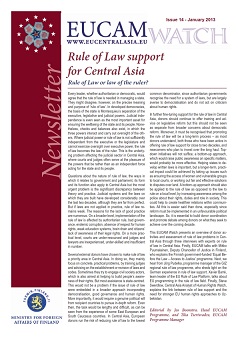Rule of Law support for Central Asia
Rule of Law support for Central Asia
Author(s): Jos Boonstra, Tika Tsertsvadze, Mikko Puumalainen, Jörg Pudelka, Xavier Barré, Steve Swerdlow
Contributor(s): Jos Boonstra (Editor), Tika Tsertsvadze (Editor)
Subject(s): International Law, Human Rights and Humanitarian Law, Government/Political systems, Politics and law, Sociology of Politics, Sociology of Law
Published by: CEPS Centre for European Policy Studies
Keywords: Central Asia; rule of law; democracy; judicial power; political system; human rights;
Summary/Abstract: Every leader, whether authoritarian or democratic, would agree that the rule of law is needed in managing a state. They might disagree, however, on the precise meaning and purpose of ‘rule of law’. In developed democracies, the basis of the state is Montesquieu’s separation of the executive, legislative and judicial powers. Judicial independence is even seen as the most important asset for ensuring the wellbeing of the state and its people. Nonetheless, checks and balances also exist, in which the three powers interact and carry out oversight of the others. Where judicial power or rule of law is not sufficiently independent from the executive or the legislature and cannot exercise oversight over executive power, the rule of law becomes the law of the ruler. This is the underlying problem affecting the judicial sector in Central Asia, where courts and judges often serve at the pleasure of the powers that be rather than as an independent force acting for the state and its people.
Series: EUCAM Watch
- Page Count: 7
- Publication Year: 2013
- Language: English
- Content File-PDF

